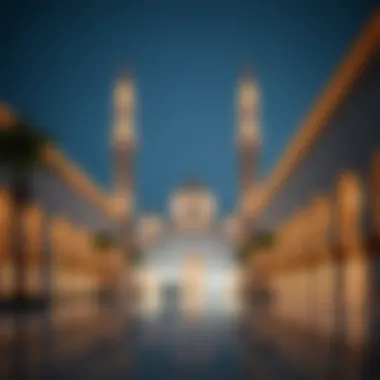Ramadan in the UAE: Key Insights for 2024


Intro
Ramadan is more than just a calendar event; it embodies a spiritual journey for Muslims around the globe, and particularly in the United Arab Emirates. This holy month, which involves fasting from dawn until sunset, represents a time for reflection, self-improvement, and community. In 2024, as the crescent moon signals the beginning of Ramadan, its arrival in the UAE will be observed with a blend of ancient customs and modern practices.
Understanding the start of Ramadan involves more than merely marking dates on a calendar. The Islamic lunar calendar shifts approximately 10 to 12 days earlier each year compared to the Gregorian calendar, leading to varying observance times for Ramadan. In the UAE, local traditions play a pivotal role in shaping the atmosphere during this sacred month. Streets will buzz with activity as families prepare for iftar, the meal that breaks the day’s fast, gathering around tables filled with traditional dishes.
Market Trends and Insights
As Ramadan approaches, various market dynamics emerge, particularly in the realms of real estate and consumer behavior. This period often brings about unique market trends that can be useful for homebuyers, investors, and real estate agents alike.
Current Market Analysis
In the lead-up to Ramadan, the UAE’s property market often experiences a shift in activity. Many tenants seek to refresh their living arrangements as they plan for family gatherings. There’s an uptick in rental inquiries, particularly for larger homes that can accommodate relatives during this time. Investors should take note: properties near communal iftar events or mosques might see increased demand. Similarly, the retail market tends to flourish as shoppers rush to purchase food and gifts for the month ahead.
Future Predictions
Looking forward, analysts anticipate that as the UAE’s population continues to grow, the influence of Ramadan on the real estate market will only intensify. The growing number of expatriates is expected to introduce fresh demand for short-term rentals around this festive period. Moreover, economic trends suggest that hospitality sectors, particularly restaurants and hotels, will adapt by offering special Ramadan menu items or discounts, enticing both locals and tourists.
"Ramadan in the UAE offers a unique blend of cultural observance and business opportunity; understanding this can inform strategic investment decisions."
Navigating the housing market during Ramadan can be advantageous for astute investors. Being aware of these trends isn't just a nice-to-have; it's crucial for making solid decisions.
Property Investment Strategies
With the dynamics of Ramadan influencing the property landscape, having a game plan is essential for anyone looking to invest in real estate in the UAE around this time.
Tips for First-Time Investors
- Research Local Customs: Knowing how Ramadan influences lifestyle and housing demand will help you identify ideal investment properties.
- Connect with Real Estate Agents: Local agents have their finger on the pulse and can offer insider knowledge about upcoming trends.
- Consider Location: Properties near community centers or places of worship are often in higher demand during Ramadan's peak.
Understanding the Rental Market
The rental market can be a bit rocky during Ramadan, with availability and demand fluctuating significantly. Many landlords may hesitate to commit to long-term leases, opting for short-term agreements instead. Understanding these nuances can provide insight into negotiating better terms:
- Seasonal Increases: Expect higher rental prices close to the start and during Ramadan.
- Favorable Negotiations: Post-Ramadan may offer opportunities to negotiate favorable terms as landlords aim to fill vacancies swiftly.
By paying close attention to these elements, you can navigate the market effectively, whether you are a homebuyer, investor, or simply someone looking to rent a space in the vibrant UAE landscape.
Preface to Ramadan
Ramadan stands as a monumental period in the lives of millions worldwide, particularly within the United Arab Emirates. This holy month offers not just a time for fasting but extends deeper into the realms of spirituality and community engagement. Understanding Ramadan enhances one’s appreciation for its cultural and religious significance, making it foundational for this article.
The core of Ramadan revolves around the act of fasting from dawn until sunset, a practice aimed at instilling discipline, reflection, and empathy. The significance of this observance extends beyond mere rituals and infiltrates daily life, influencing work schedules, culinary practices, and social interactions.
Understanding the Islamic Calendar
The Islamic calendar is based on lunar cycles, making it inherently different from the Gregorian calendar.
The lunar cycle and its implications for timing
The lunar cycle, lasting approximately 29.5 days, plays a crucial role in determining the start of Ramadan. The sighting of the crescent moon marks the beginning of this holy period, and this cyclical nature leads to Ramadan moving several days earlier each year when compared to the Gregorian calendar. This shift allows for the observance of Ramadan across varying seasons, giving different cultural contexts a unique experience year after year.
The lunar calendar introduces a special characteristic; its reliance on moon sighting practices enhances community involvement. Traditionally, local mosques or religious leaders announce the start of Ramadan after confirming the moon sighting, fostering unity and communal participation in the faith.
While this method is widely accepted and celebrated, it comes with its share of challenges. Weather conditions, geographical differences, and individual perceptions can lead to varied start days, prompting discussions within communities about the timing.
The significance of moon sightings
Moon sightings hold deep-rooted significance within Islamic practices, highlighting the strong connection between celestial movements and religious events. These observations are not just about marking dates; they reflect the Islamic belief in the divine nature of time as dictated by God's creation.
The observance of the moon not only symbolizes the start of Ramadan but also encourages spiritual mindfulness. Many Muslims see this as an opportunity for increased prayer and retrospection, establishing a period of shared faith and anticipation.


Although this practice is deeply valued, it may introduce a layer of unpredictability. Some communities may adhere strictly to traditional sightings while others might rely on calculated predictions. This can create slight discrepancies in how different communities experience the commencement of Ramadan, leading to discussions about modernity versus tradition.
Cultural Importance of Ramadan
The cultural significance of Ramadan in the UAE transcends personal reflection and extends into wider community interactions.
Spiritual reflection and community bonding
Spiritual reflection during Ramadan offers an opportunity for individuals to connect with their faith on a deeper level. This month serves as a time for self-assessment, fostering a sense of gratitude and humility. The act of fasting, paired with prayers and Quranic recitations, establishes a rhythm that encourages introspection.
Moreover, Ramadan strengthens community bonds. Associates gather for communal prayers at mosques and share meals for Iftar, breaking their fast together. These gatherings become a vital aspect of social life, where families and friends strengthen connections and extend goodwill to one another.
The unique feature of this period is its ability to promote inclusivity. Non-Muslims in the UAE often partake in this atmosphere of generosity, fostering mutual respect and understanding among diverse cultures. However, balancing personal reflections while maintaining social interactions can be challenging for some, creating an intricate dance of meeting individual needs against broader communal commitments.
Charitable acts and their significance
Charitable acts gain tremendous prominence during Ramadan, known as a time for giving and sharing. The act of Zakat, or almsgiving, is emphasized, encouraging individuals to support those in need. This period prompts people to re-evaluate their social responsibilities and extend their compassion to underprivileged communities.
The aspect of charity during Ramadan attracts significant attention, making it universally recognized as a time of generosity and goodwill. Local organizations often ramp up their initiatives, providing meals, clothing, and financial support to those less fortunate.
However, it’s essential to recognize the flip side. Some might experience charity fatigue, where the influx of initiatives can overwhelm potential donors, leading to disengagement. Hence, balancing these needs while maintaining a spirit of giving is crucial for fostering a continued commitment to charitable practices.
When Does Ramadan Begin in ?
Understanding when Ramadan begins is a vital aspect not only for those practicing Islam, but also for expats, businesses, and residents in the UAE. The starting date of Ramadan affects many areas of life, from cultural practices to work schedules. It is fundamentally rooted in the Islamic lunar calendar, where each month begins with the sighting of the new moon. Therefore, the anticipation surrounding the start of Ramadan is significant, as it influences both community interactions and personal reflections.
Projected Dates based on Moon Sighting
Expected lunar observations
Lunar observations play a central role in determining the commencement of Ramadan each year. Islamic tradition dictates that once the new moon is sighted, Ramadan is declared to have started, creating a unique rhythm to the month. This uniqueness is particularly relevant in the UAE, where local communities eagerly anticipate these sightings on specific days leading up to the holy month.
One of the key characteristics of these observations is their reliance on local mosque authorities, which enhances community engagement and fosters a sense of togetherness among individuals waiting for announcements. The excitement is palpable, as families and friends often gather for evening meals, discussing potential moonsightings and their implications for the holy month ahead.
However, there are challenges involved. Weather conditions can obscure views of the moon, causing some uncertainty around the start date. Additionally, different countries might declare the beginning of Ramadan on different days based on their sightings, leading to a sense of variability and confusion.
"The moon sighting is more than just an astronomical event; it’s a community ritual that brings people together in anticipation and faith."
Official announcements by religious authorities
Following the lunar observations, official announcements from local religious authorities finalize the start date of Ramadan each year. These proclamations are essential because they bring clarity to the dates, allowing everyone to prepare accordingly—be it for fasting, prayers, or community activities. The Central Council of Islamic Affairs in the UAE, for instance, plays a pivotal role in standardizing these announcements.
What marks these announcements as particularly beneficial is their ability to unify communities across the UAE, providing a common start date backed by religious authority. This shared understanding helps streamline arrangements for events and gatherings, making the transition into Ramadan smoother for residents. However, the process can sometimes create tension, especially in cases where an expected sighting differs from the official declarations.
Variability of Dates
Regional differences in sighting
The variability of Ramadan dates can be attributed significantly to regional differences in moon sighting practices. In various parts of the UAE, different communities may have their own methods for determining the sighting, leading to potential discrepancies. Some may rely on traditional lunar observations, while others could follow a more scientific approach.
This difference is an important consideration in this article. It highlights the culturally rich tapestry of the UAE, showcasing how local customs can shape experiences around Ramadan. For instance, in some emirates, community mosques might hold moon sighting events, whereas others might depend heavily on formal channels for confirmation. These varied practices add depth to the recognition of Ramadan’s start.
Community reflections on timing
Community reflections around the timing of Ramadan also contribute to the sense of variability experienced annually. As families prepare for the holy month, discussions and local narratives come into play—some express excitement and others share concern over missed opportunities or timing mishaps. These reflections can unite individuals, offering a common ground for conversation and celebration, while also providing a platform for expressing personal thoughts about the month ahead.
This aspect of community engagement, differing opinions, and collective anticipation adds a layer of richness to how Ramadan is observed. Engaging in communal conversations signifies much more than simply marking dates on a calendar—it encapsulates the essence of being part of a greater whole, enhancing the spiritual significance of the month for many.
Through understanding the projected dates, the role of lunar observations, and the official announcements, one reveals how intertwined cultural significance and practical implications are in the local context of the UAE. This knowledge not only grounds residents but also supports expats and potential investors as they navigate through this holy time, ensuring a collective experience that resonates with respect and understanding.
Observing Ramadan in the UAE
Observing Ramadan in the UAE is a multifaceted experience that deeply reflects the cultural and spiritual aspects of this significant Islamic month. While the core essence of Ramadan is to prioritize spiritual growth and community bonding, the local traditions and practices offer unique flavors that enhance its observance. The UAE, a melting pot of cultures and nationalities, embraces Ramadan by intertwining its rich heritage with the customs brought by expatriates. This blending creates a unique environment that allows for varied interpretations and celebrations of the holy month.


Local Traditions and Customs
Food customs during Suhoor and Iftar
Eating customs form a pivotal aspect of Ramadan observances. Suhoor, the pre-dawn meal, and Iftar, the meal breaking the fast, are not merely acts of eating; they are communal traditions that weave together families and communities. The enjoyment of delicacies like dates, lentil soup, and various savory dishes during these times creates a festive atmosphere.
Key characteristics include the emphasis on sharing food, often leading to communal gatherings, which embody the essence of Ramadan. Traditional meals are more than just sustenance; they serve as a calendar of sorts, reminding those who partake of their cultural lineage and religious duties. While Suhoor may vary from family to family, Iftar typically showcases elaborate feasts filled with choices from various regions, thereby promoting a sense of diversity and inclusion.
However, the beauty of these gastronomic gatherings comes with a challenge—managing dietary preferences and restrictions. People with specific dietary needs can find it tricky to navigate traditional offerings, making it essential for hosts to be mindful and adaptive. Thus, such customs contribute positively to the overall aura of Ramadan while posing considerations for inclusivity.
Community gatherings and prayers
Community gatherings and prayers form an integral part of the Ramadan experience in the UAE, where places of worship become bustling hubs of spiritual rejuvenation. The nightly Taraweeh prayers draw individuals together, invigorating the sense of belonging and collective spirituality. These gatherings offer more than just prayer; they engender a profound connection to faith and community.
The unique feature here lies in the celebratory nature of these prayers, often accompanied by cultural activities such as recitations of the Quran, lectures, and discussions about the importance of Ramadan. These events attract people from various backgrounds, where the exchange of ideas and experiences enriches the communal atmosphere.
Though the emphasis on community is breathtaking, it begs the question of accessibility. For some, particularly the elderly or those with mobility issues, attending large gatherings may pose challenges. Thus, while these communal aspects bolster togetherness, they might also highlight a need for accommodations that ensure everyone can take part in the spiritual journey.
Workplace Adjustments
Reduced working hours
During Ramadan, reduced working hours are not just a concession; they signify respect for the observances of those who are fasting. Companies in the UAE typically implement shorter hours to support their employees, allowing them more time for reflection and evening prayers. This adjustment highlights the balance employers seek to maintain between productivity and cultural sensitivity.
A noteworthy characteristic of this policy is its widespread acceptance across various sectors, enabling employees to engage more fully with the spirit of Ramadan. By reducing hours, companies foster an environment that acknowledges and respects the collective mood of the holy month.
However, there's often a duality to this—a balancing act for employers to keep up with business needs while catering to a varied workforce. While it's beneficial in creating workplace harmony, it can also stir concerns over productivity levels and operational efficiency.
Policies for non-Muslim employees
Policies for non-Muslim employees during Ramadan reflect the UAE’s commitment to inclusivity. As the workforce comprises a mix of various nationalities and faiths, companies often introduce guidelines that allow non-Muslims to navigate their work during this sacred time sensitively.
One notable aspect is the communication of cultural practices and expectations, which contributes to a more harmonious work environment. Such policies might include guidelines about eating in public spaces and accommodating flexible schedules for non-Muslim employees to align with their colleagues' observances.
While these measures are designed to integrate and respect the religious significance of Ramadan, they can sometimes lead to misunderstandings if not communicated effectively. Therefore, well-defined policies can significantly enhance workplace morale and ensure that all employees feel included, regardless of their beliefs.
Through understanding the significance of these customs and workplace practices, one can better appreciate the comprehensive experience of observing Ramadan in the UAE. It portrays a culture that values unity, respect, and shared experiences, marking this month as a truly unique and inviting time for everyone.
Impact on Daily Life in the UAE
The onset of Ramadan brings profound changes to daily life in the UAE, marking a significant transition that touches nearly every aspect of society. This holy month is not merely a period of fasting; it shapes social norms, business operations, and communal interactions on multiple levels. Everyone, from local residents to expats and tourists, feels the effects of this sacred time, as patterns of living undergo adaptations to honor the traditions of Ramadan.
Changes in Retail and Services
Business hours during Ramadan
During Ramadan, business hours shift to accommodate the fasting schedule. Most offices and shops adjust their timing, often opening later in the morning and closing earlier in the evening. This change serves a dual purpose: it allows employees to observe their fasting without the pressure of their typical work hours, and it also aligns with the bustling activity that occurs after sunset.
The key characteristic of Ramadan business hours is flexibility. That means that instead of the usual 9-5 routine, businesses might operate from 10 AM to 3 PM or even 11 AM to 5 PM, depending on the sector. It provides a more relaxed environment for those observing the fast, allowing them space to prepare for evening meals and spiritual gatherings. Though businesses need to adapt to this timing, many find that it can actually enhance productivity and morale during the month, fostering a sense of community among coworkers.
However, it's not without its challenges. Non-Muslim employees may feel the pinch, especially if their roles are tied to customer-facing duties during peak hours. All in all, the adjustments can spark important conversations about cultural sensitivity in a diverse work environment.
Demand for traditional foods and products
As Ramadan approaches, demand for traditional foods and products skyrockets. Restaurants and markets prepare to serve favorites like dates, biryani, and other delicacies that fill tables at Suhoor and Iftar, the pre-dawn and sunset meals, respectively. This surge in interest makes it an excellent opportunity for local businesses to showcase their culinary offerings and connect with customers.
The popularity of traditional foods during Ramadan stems from both cultural significance and social interaction. For many families, the meals shared during Iftar symbolize unity and gratitude. Vendors often create special bundles or discounts targeted specifically at these communal gatherings, making it a favorable choice for those looking to feed family and friends.
As a challenging aspect, however, the heightened demand can sometimes lead to supply shortages or inflated prices, which can impact lower-income households. Balancing the celebration of Ramadan with economic considerations is key in ensuring that everyone can partake in this important time.
Influence on Social Activities
Evening events and activities


When the sun sets, Ramadan transforms into a lively period full of social activities. Evening gatherings, which generally commence after Iftar, become a staple for families and friends to reconnect and celebrate. From community Iftars to cultural events, there is a palpable energy in the air, and public spaces often come alive with festivities and events aimed at uniting people during this holy month.
These evening activities are more than just entertainment; they promote social bonding and reinforce the spirit of togetherness. The unique feature of such engagements is their emphasis on inclusivity. Many gatherings welcome everyone, regardless of religious affiliation, promoting understanding and fostering communal harmony. However, this vibrancy doesn't come without its downsides. For some, the hustle of evening social events can dilute the solemnity of the month, creating a delicate balance that participants must navigate.
Restrictions on public behaviors
While Ramadan brings a sense of joy, it also comes with explicit restrictions on certain public behaviors. Consumption of food and drink in public places during daylight hours is prohibited, and many people observe a more subdued demeanor in public. This discipline underscores the spiritual journey of self-control and reflection that Ramadan embodies.
The key characteristic of these restrictions is their rootedness in respect and communal values. Being mindful of the observances of others cultivates empathy and understanding, strengthening bonds within the multicultural tapestry of the UAE.
However, these limitations can pose challenges, particularly for non-Muslim residents or visitors who may be unaware of the local traditions. It invites ongoing conversations about respect for differing customs and the delicate balance between personal freedoms and communal norms that exist during Ramadan.
Ramadan is not just about abstaining from food and drink; it’s also a chance for deeper connections and understanding among communities.
Ramadan and the Dubai Real Estate Market
Ramadan brings a unique atmosphere that influences various aspects of life in the UAE, including the real estate market. Understanding how this holy month impacts property dynamics can help homebuyers, investors, and even analysts position themselves advantageously during this season. There's more to Ramadan than just prayers and fasting; the socio-economic shifts during this time significantly affect housing trends.
Effect on Property Demand
Seasonal fluctuations in buying and renting
When Ramadan rolls around, property demand tends to ebb and flow in a fascinating way. People often re-evaluate their housing situation during this period, drawn by the myriads of cultural and communal gatherings. Families may choose to downsize or relocate to be closer to their loved ones or mosques. The essence of Ramadan—a time for togetherness and community—prompt a spike in renting short-term accommodations suited for larger gatherings. However, this can also lead to temporary downturns in property sales since many clients hit pause on their buying decisions, preferring to evaluate options another time—it’s just not the right season for big commitments.
This fluctuation also presents a unique opportunity. As potential buyers shift their priorities, savvy real estate agents and landlords can capitalize on this changing landscape by offering competitive rates or flexible leasing options. This strategic positioning makes for a beneficial choice in the market, especially since many individuals look for appealing living spaces pre-Ramadan to settle in time for Iftar dinners and family traditions.
Investor sentiment during the holy month
The sentiment among property investors tends to swing like a pendulum during Ramadan. Some see it as a chance to acquire investments at a lower rate, while others may hang back, believing it's less favorable to buy when people are preoccupied with spiritual observances instead of property searches. Investors often reassess their strategies along with the holy vibes, which informs their decisions around this time.
A key observation is that those who choose to invest during Ramadan usually do so with a longer view in mind. They recognize the potential for post-Ramadan surges, driven by families returning from summer vacations and an influx of expats. Additionally, some developers may time their new projects to align with Ramadan, harnessing goodwill and a sense of community spirit to market their properties effectively.
Community Developments and Initiatives
New developments timed for Ramadan
In the spirit of Ramadan, several property developers tend to introduce new residential projects or community initiatives designed to foster sentiments of sharing and belonging. Timing these launches for the holy month is strategic. Developers tap into the atmosphere of generosity and family-oriented gatherings, creating spaces that accommodate large families and encourage social interactions.
These initiatives often include amenities tailored to Ramadan activities, such as communal gardens for evening gatherings and dedicated prayer spaces, further enhancing their appeal. While this approach can be beneficial for attracting attention, it also requires developers to balance community needs with practicality.
Support for low-income housing during the month
Another impactful aspect of Ramadan is the heightened awareness and philanthropy surrounding the needs of low-income families. Many organizations and developers take this time to advocate for affordable housing projects or support initiatives aimed at assisting those in need.
The upliftment of low-income housing not only showcases compassion but also creates a more inclusive community. While financial viability often puts a strain on such initiatives, the goodwill generated endears developers to the public, thus enhancing their market image. It’s a win-win that shows the strengths of community-centered development, especially during a month that emphasizes sharing and compassion.
The End
In wrapping up our discussion on the start of Ramadan in the UAE for 2024, it's vital to recognize that this period is much more than just a month of fasting. It's a time filled with profound cultural significance and various implications for residents, expats, and investors alike. Understanding these nuances helps deepen one's appreciation of the observance and its role in the broader societal context.
Reflections on Ramadan Practices
Summary of Cultural Significance
The cultural significance of Ramadan extends beyond the simple act of fasting; it intertwines community, spirituality, and tradition. This holy month serves as an opportunity for individuals to engage in self-reflection, enhance their spiritual connection, and strengthen the bonds with family and friends.
One of the key characteristics of Ramadan is the emphasis on charity. During this time, many Muslims actively participate in charitable acts, supporting local and international causes. This spirit of giving is palpable, fostering a sense of unity across varied communities. In the context of the UAE, where the population is richly diverse, such practices contribute to fostering intercultural understanding and relationships. The unique feeling of camaraderie that comes with community iftars and shared moments speaks volumes about the values highlighted during Ramadan.
However, it is crucial to understand that the impact of the month can vary widely depending on social, economic, and even personal factors. For some, the month is met with joy and anticipation, while others may find challenges balancing work and religious obligations. In examining these complexities, we gain a well-rounded perspective that is particularly relevant for our examination.
Implications for Residents and Investors
The implications of Ramadan practices resonate throughout various layers of the UAE economy and social fabric. For residents, the holy month brings about adjustments in daily routines, including altered work hours and increased social gatherings. This dynamic creates unique opportunities for community engagement that highlight the deep-rooted value attached to family and friendship.
For investors, understanding the market fluctuations during Ramadan is equally important. The real estate sector, for instance, sees a change in demand patterns as families and individuals reflect on their living situations during this season. Property developments that cater to community-driven amenities often thrive, highlighting a trend where investors may find opportunities to create spaces that embrace cultural values.
To summarize, the implications of Ramadan practices offer insights not just into observance but also how the community interacts in both social spheres and economic frameworks. This holistic understanding serves as a valuable compass for residents and potential investors navigating the UAE landscape.
Pro Tip: Understanding how cultural events like Ramadan influence buyer behavior and investor sentiment is key for anyone looking to navigate the UAE's housing market efficiently.







